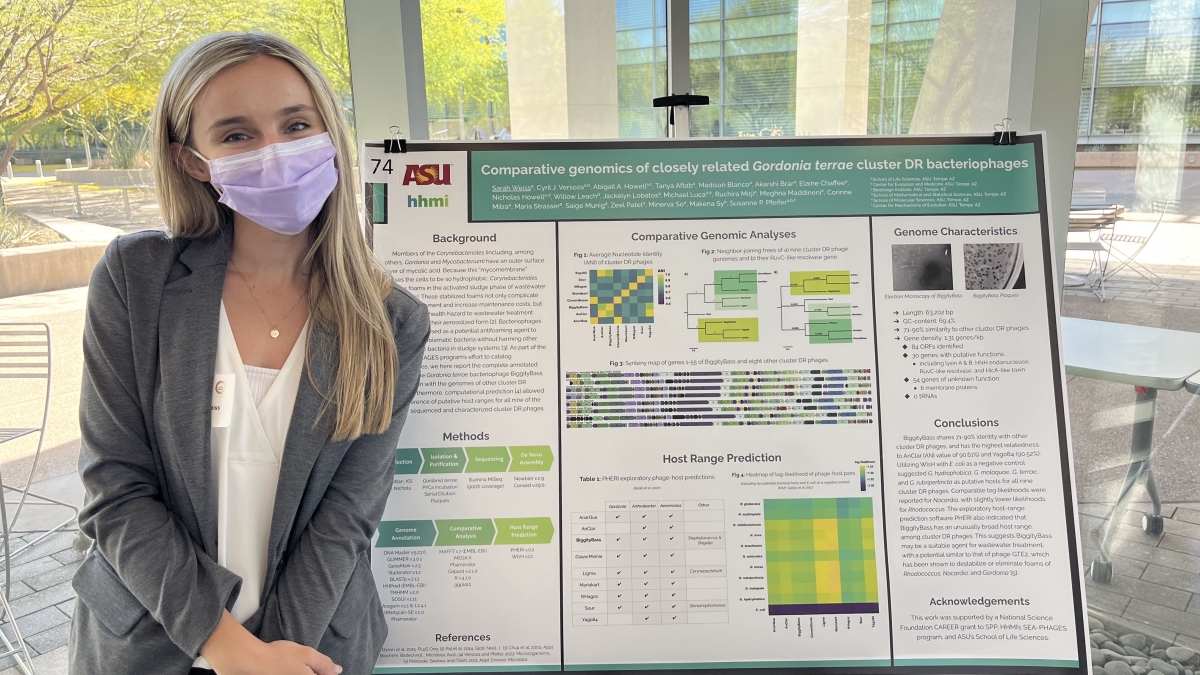Phage Hunters: A course that advances the undergraduate research experience at ASU

Undergraduate researcher Sarah Weiss presented her CURE program research at the Annual Meeting of the American Society for Microbiology. Photo courtesy Susanne Pfeifer
Most students are drawn to STEM disciplines because of their passion for the sciences and strong drive to affect meaningful change in the world. However, the leap from passion to experienced researcher is not always a simple one. Many students don’t know where to start in gaining their own research experiences, and putting together resumes and applications for graduate schools or industry positions can often feel very intimidating.
Mentoring programs provide vital support as students navigate these challenges. Assistant Professor Susanne Pfeifer from the School of Life Sciences has developed a Course-based Undergraduate Research Experience (CURE) called Phage Hunters to give students the opportunity to gain hands-on experience in the laboratory and publish meaningful research.
"As part of this CURE, students gain hands-on and marketable experience with genomic data generation and analysis, and they design science-outreach projects to share this work with the community, for example, at local grade schools," Pfeifer said.
The CURE program is supported by the National Science Foundation Faculty Early Career Development Program and by Howard Hughes Medical Institute’s Science Education Alliance-Phage Hunters Advancing Genomics and Evolutionary Science.
Since it started in fall 2019, 71 undergraduate students with different backgrounds and experience levels have joined the CURE program. Students from various departments, including the School of Life Sciences, the School of Molecular Sciences, the School of Politics and Global Studies and the School of Mathematical and Statistical Sciences, have participated.
Pfeifer believes that diversity in research is vital.
“I firmly believe that undergraduates play an important role in vibrant (and in our case interdisciplinary) research environments as research teams collectively benefit from the enriching differences in our experiences, perspectives and ways of thinking," she said.
Students of the fall 2022 cohort investigating bacteriophage genomic diversity. Photo Courtesy Susanne Pfeifer
Pfeifer investigates genetic and evolutionary processes across different species, from single individuals to whole population dynamics. With this course, she has opened the doors of her laboratory to undergraduate students ready to step up their research careers.
"Each semester, the topics may vary, but in general, students will learn computational genomics techniques to better understand the evolution and genetics of bacteria-infecting viruses (i.e., bacteriophages)," she said.
Thanks to their experience in the Phage Hunters CURE, undergraduate students, in collaboration with graduate TAs, have published the results of their research in high-impact microbiology journals. Most recently, students published four articles from the spring 2022 session.
Two articles characterize the genome sequences of the Gordonia bacteriophage BiggityBass and the mycobacteriophage Phegasus, and the other two perform phylogenomic analyses and predict host ranges for all Gordonia terrae cluster DR and cluster P mycobacteriophages known to date.
For undergraduates, having the opportunity to publish and start building their credentials in academia so early in their careers is priceless.
"The published research performed by the undergraduates trained and mentored by me in this CURE is just one example of the achievements of our dedicated and talented ASU undergraduates," Pfeifer said.
The CURE program is open to all undergraduates seeking to advance their research careers. If you are a student interested in joining the CURE program, read more about the research performed in the Pfeifer Lab or contact Pfeifer directly via email.
Pfeifer is affiliated with the School of Life Sciences, the Biodesign Center for Mechanisms of Evolution and the Center for Evolution and Medicine.
This article was prepared in collaboration with Susanne Pfeifer, School of Life Sciences Graduate Science Writer Anaissa Ruiz-Tejada and School of Life Sciences Manager of Marketing and Communications Dominique Perkins.
More Science and technology

4 ASU researchers named senior members of the National Academy of Inventors
The National Academy of Inventors recently named four Arizona State University researchers as senior members to the prestigious…

Transforming Arizona’s highways for a smoother drive
Imagine you’re driving down a smooth stretch of road. Your tires have firm traction. There are no potholes you need to swerve to…

The Sun Devil who revolutionized kitty litter
If you have a cat, there’s a good chance you’re benefiting from the work of an Arizona State University alumna. In honor of…


